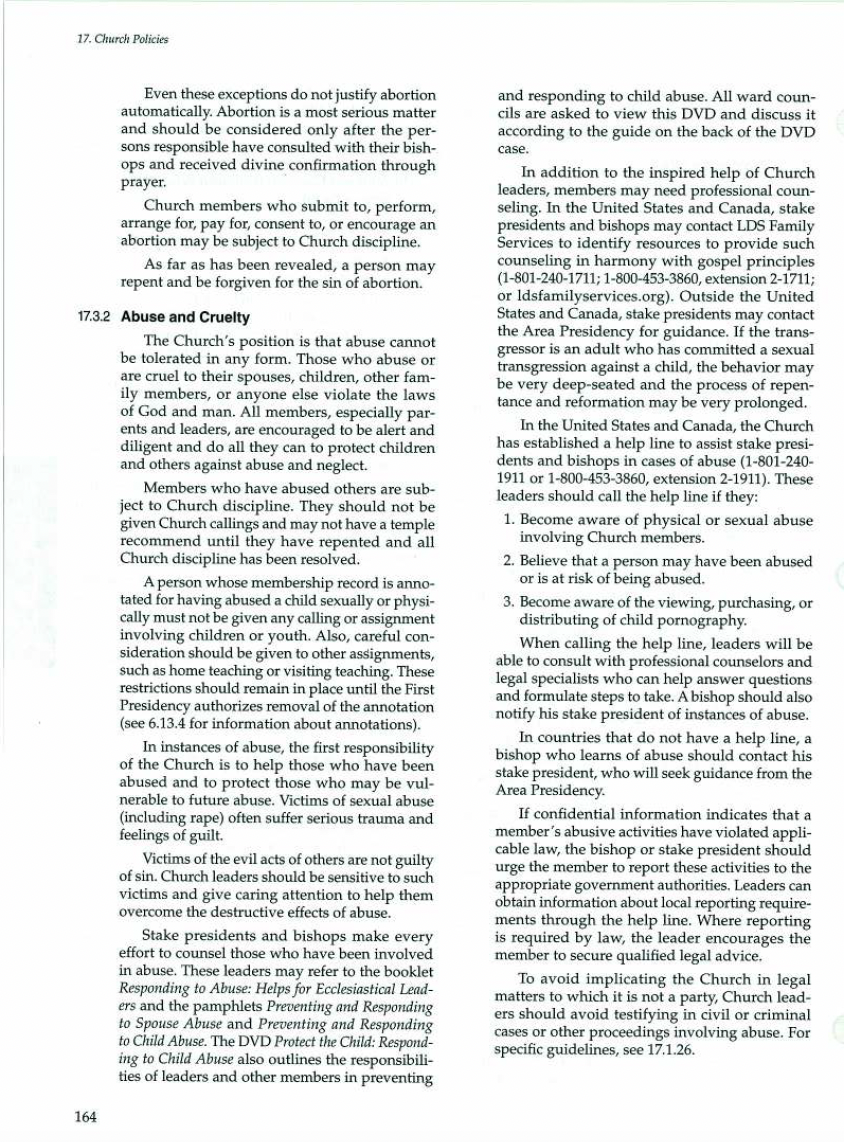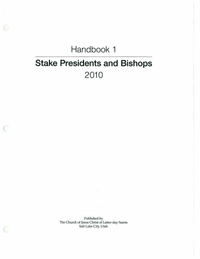2010 policies on dealing with child abuse for bishops.
- Type
- Manuscript
- Source
- The Church of Jesus Christ of Latter-day Saints LDS
- Hearsay
- Direct
- Reference
Handbook 1: Stake Presidents and Bishops (Salt Lake City: The Church of Jesus Christ of Latter-day Saints, 2010), 164, accessed July 27, 2021
- Scribe/Publisher
- The Church of Jesus Christ of Latter-day Saints
- People
- The Church of Jesus Christ of Latter-day Saints
- Audience
- Reading Public
- Transcription
Abuse and Cruelty
The Church's position is that abuse cannot be tolerated in any form. Those who abuse or are cruel to their spouses, children, other family members, or anyone else violate the laws of God and man. All members, especially parents and leaders, are encouraged to be alert and diligent and do all they can to protect children and others against abuse and neglect.
Members who have abused others are subject to Church discipline. They should be not given Church callings and may not have a temple recommend until they have repented and all Church discipline has been resolved.
A person whose membership record is annotated for having abused a child sexually or physically must not be given any calling or assignment involving children or youth. Also, careful considerations should be given to other assignments, such as home or visiting teaching. These restrictions should remain in place until the First Presidency authorizes the removal of the annotation (see 6.13.4 for information and annotations).
In instances of abuse, the first responsibility of the Church is to help those who have been abused and to protect those who may be vulnerable to further abuse. Victims of sexual abuse (including rape) often suffer serious trauma and feelings of guilt. Victims of the evil acts of others are not guilty of sin. Church leaders should be sensitive to such victims and give caring attention to help them overcome the destructive effects of abuse.
Stake presidents and bishops make every effort to counsel those who have been involved in abuse. These leaders may refer to the booklet Responding to Abuse: Helps for Ecclesiastical Leaders and the pamphlets Preventing and Responding to Spouse Abuse and Preventing and Responding to Child Abuse. The DVD Protect the Child: Responding to Child Abuse also outlines the responsibilities of leaders and other members in preventing and responding to child abuse. All ward councils are asked to view this DVD and discuss it according to the guide on the back of the DVD case.
In addition to the inspired help of Church leaders, members may need professional counseling. In the United States and Canada, stake presidents and bishops may contact LDS Family Services to identify resources to provide such counseling in harmony with gospel principles. Outside the United States and Canada, stake presidents may contact the Area Presidency for guidance. If the transgressor is an adult who have committed a sexual transgression against a child, the behavior may be very deep-seated and the process of repentance and reformation may be very prolonged.
In the United States and Canada, the Church has established a help line to assistant stake presidents and bishops in cases of abuse. These leaders should call the help line if they:
1. Become aware of physical or sexual abuse involving Church members.
2. Believe that a person may have been abused or is at risk of being abused.
3. Become aware of the viewing, purchasing, or distributing of child pornography.
When calling the help line, leaders will be able to consult with professional counselors and legal specialists who can help answer questions and formulate steps to take. A bishop should also notify his stake president of instances of abuse.
In countries that do not have a help line, a bishop who learns of abuse should contact his stake president, who will seek guidance from the Area Presidency.
If confidential information indicates that a member's abusive activities have violated applicable law, the bishop or stake president should urge the member to report these activities to the appropriate government authorities. Leaders can obtain information about local reporting requirements through the help line. When reporting is required by law, the leader encourages the member to secure qualified legal advice.
To avoid implicating the Church in legal matters to which it is not a party, Church leaders should avoid testifying in civil or criminal cases or other proceedings involving abuse. For specific guidelines, see 17.1.26.
- Citations in Mormonr Qnas
The B. H. Roberts Foundation is not owned by, operated by, or affiliated with the Church of Jesus Christ of Latter-day Saints.


